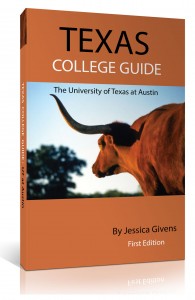Now Available – the Texas College Guide: The University of Texas at Austin. 
We are excited to announce that Jessica Givens’ new book, Texas College Guide: The University of Texas at Austin, is now available for purchase in hard copy or as an e-book from Amazon! Click here to order. This new guide walks its reader through every aspect of applying to UT, from a review of the school’s admissions practices to a major-by-major breakdown of each school.
About the Book
Last summer, Jessica decided she should write a book about everything she knows about applying to The University of Texas. This book combines Jessica’s knowledge from the field with information currently scattered across the school’s hundreds of webpages and includes information gleaned from speaking directly with the University and the various schools within it. In her words,
“After years of working with students and achieving a very high success rate of helping students gain admission to UT Austin, I have seen that a proven track record of involvement and focus in a given area can provide students with a real edge in admission to UT, and I’ve really had it with deception and subterfuge. UT applicants – you or your kids or your grandkids – are real people with meaningful histories and experiences that merit an honest and comprehensive display. However, you also deserve to understand what makes an applicant competitive for a given major, so that you don’t waste your major selection on choices that are absurd long shots. Next, you need to understand how the majors are different, what types of careers they cultivate, and what sorts of job and income prospects you’ll have after graduation. Finally, you need to know the other options that exist for paving a pathway to the University of Texas at Austin, because a rejection letter as an incoming freshman is not the end of the world, nor is it the end of the story. And, that’s why I’ve written this book, to give you the information you need and to prevent you from falling victim to shysters in this dodgy day and age of admissions chicanery. Additionally, I’ve fact-checked every aspect of my work with the University of Texas, combing their website for content and keeping in close contact with admissions and various UT departments. This book is a one-stop reference for UT major selection and admissions.”
Whether you’ll be applying to school this fall, next year, or even if you’re still several years out – this book will guide you through the process and give you a solid foundation for an admission strategy that makes sense.
Table of Contents
This is an abridged version of the Table of Contents – there is A LOT covered – but it will give you an idea of the flow of the book.
Introduction
UT Admissions Practices
– Academic Fit
– Scoring a File
– Major Selection
– Looking for Loopholes
– Undecided
– To AP or Not to AP?
– Using Your Local Community College
School and Major Overviews: The Cockrell School of Engineering / The Moody College of Communication / The School of Social Work / The College of Education / The Jackson School of Geosciences / College of Fine Arts / College of Architecture / College of Liberal Arts / The College of Nursing / The College of Natural Science / The McCombs School of Business / The School of Undergraduate Studies
University Statistics
The Application Itself
– Resume
– Essays
– Letters of Recommendation
– Supplemental Information Form
Honors Programs
Alternate Pathways to UT
Not Discussion Financial Aid
Afterword
Excerpt
Here is an excerpt from the overview of the Cockrell School of Engineering.
I want the book! How do I get it?
The book is now available on Amazon as a paperback or for Kindle.
Buy It Now